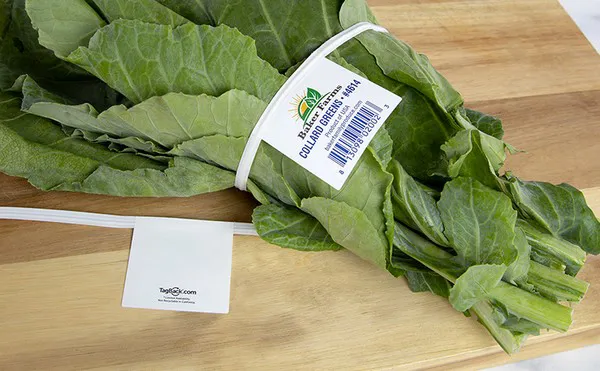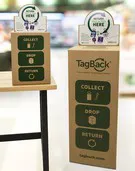There's no doubt about it; sustainability is top of mind for today's consumers, whether it's around how their food is grown or what it's put in in a grocery store. In fact, sustainable packaging is an issue trending across the produce aisle, and that includes even smaller parts of the packaging category, such as tags and closures.
That makes it a priority for companies such as Bedford, a produce identification products manufacturer--so much so it recently commissioned a sustainability report to share insights about how it approaches sustainability with its products and manufacturing processes.
However, sustainability is a complex issue. In the eyes of consumers, single-use plastic is the primary problem. Yet, the United States Environmental Protection Agency reports that the most sustainable option is reducing raw material consumption or reusing what's made.
Reusing what's made is, in fact, the concept behind Bedford's sustainability initiative, the TagBack® program. The program allows produce growers, retailers, and consumers to return its produce ties and tags back to Bedford, which will then sort and upcycle all qualified returns through its in-house equipment.

Developing the program
"Due to our packaging's small nature and limitations of existing systems, there was no known way to recycle or return the packaging products that we produce," said Belinda Heidebrink, product marketing lead, Bedford Industries in Worthington, Minnesota. "So we developed in-house equipment that could sort, separate and process our tie and tag products into material that could be upcycled into new products. This program provided a return solution for all of our product lines."
In turn, growers and consumers embraced the program. To participate in it, growers added the TagBack logo to a small section of their branded identification tags or ties purchased through Bedford. In turn, this directed consumers to its TagBack website, instructing them how to return the tie or tag via a drop box location or mail.
The program was introduced in 2019 at the then-PMA show, not long after the pandemic hit. "For the first time in many years, the conversation in the produce aisle became less about sustainability," said Heidebrink. "That returned, however, and the program has experienced exponential growth, bringing our cumulative total of returns up to approximately 170,000 pounds over a three-year period." Today, close to 100 brands across numerous markets print the TagBack logo on their ties and tags.
 With momentum like this, the initiative is ongoing. "We envision the program to continue growing and diverting more ties and tags from the landfill," says Heidebrink. "We're researching and developing new uses for the reclaimed materials and will continue to promote the program with the hopes of getting drop boxes in more retail locations across the United States."
With momentum like this, the initiative is ongoing. "We envision the program to continue growing and diverting more ties and tags from the landfill," says Heidebrink. "We're researching and developing new uses for the reclaimed materials and will continue to promote the program with the hopes of getting drop boxes in more retail locations across the United States."
Connect with retail partners
Growers interested in the program can ask their retail partners about it and connect them with a Bedford representative. The free customizable boxes come in two sizes--standard: 15" x15" x37" and mini: 12" x12" x16" and then Bedford works with retailers periodically to get returns sent back to the company.
While sustainability continues to be a concern for growers and consumers, growers and shippers also have another hot topic on their minds: automation. "As growers look to address labor shortages and increase efficiency, advancement in packaging technology for the fresh produce industry has been particularly challenging due to the environments in which identification ties and tags are being applied," said Heidebrink.
However, within the last year, Bedford developed a new identification solution and compatible machinery. The Tag Tyer™ can be customized to apply TagTies™ directly in the field or packing shed.
Whether it's addressing consumers' wants or growers' needs, balancing the requirements/desires of every part of the produce supply chain can be challenging. "Consumers are increasingly demanding more sustainable packing in the produce aisle," says Heidebrink. "Growers are attempting to address this while working through challenges like finding cost-effective, durable packaging alternatives that withstand the storage requirements of many fresh produce items to provide necessary labeling and traceability requirements."
 For more information:
For more information:
Alyssa Schmidt
Bedford Industries
Tel.: +1 (507) 376-4136
[email protected]
https://www.bedford.com/
